英语写作基础1教学日历(美方单学位)荣秀丽
高三英语基础写作basic writing课件

(2005年广东高考题)Michael是一名美国中学生,在学 校里选修汉语。他利用暑假到中国进修,希望进一步
了解中国文化。有一天,他看到下面有关成语的漫画, 不大明白其中的意思。请你用英语把漫画所表达的故事 和寓意写成一段短文,向他解释。
注意:1.词数:在80—120词之间; 2.参考词汇:bump into(撞上),hoe(锄头)
写作要求:请根据以上文字提示用5个句子来描述 故事里的全部内容。注意故事的连贯性和文章的 过渡。
• ①【思路导航】 • 这是一篇记叙文,是一则寓言故事:掩耳盗铃。这里要求用5句话完成,只要抓住记
叙文的要素:时间、人物、地点和发生了什么事就行了。在这里要注意故事情节的完 整性,要有头有尾,但不可瞎编或增多故事情节。考试主要抓住故事的要素和以下几 个要点即可完成一篇漂亮的文章。
基础写作步骤
六、誊写
注重基础,单词短语多。 2. 培养写句意识,以动词为中心。
Summaries:
1. Use different ways to describe one sentence. 2. Making sentences by using non-predicate. 3.Sentence patterns are always useful.
基础写作步骤
一、审题
理清文字信息
判断文章格式、人称、要点、时态、
基础写作步骤
二、抓要点
确定主要行为
用一两个词或短语 写出每句的要点
基础写作步骤
三、扩展成句
形成基本语义单位
用一些简单句、不同句型、不同句式或 高级词汇将要点扩展成句
基础写作步骤
四、连句成文
时间 空间 细节 连贯 呼应
背景(适当增加时间、地点条件等)、 逻辑关系、开头与结尾、巧用连接词和 过渡句
英语写作基础教程课件.
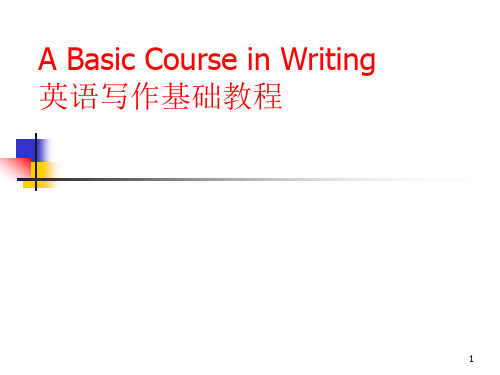
The comma (,)
4. Nonrestrictive clauses and phrases are Set off by commas. 5. Commas set off parenthetical elements. 6. In dates, a comma is used to separate the day and the year if the order is month-day-year, no comma need be used If the order is day-month-year.
right
12
Arrangement
13
Arrangement
14
Arrangement
Hyphen
Байду номын сангаас
-
Article
a/an/the
Preposition of/in/at/on…
Coordinating conjunctions and/or/but….
Infinitives
to+…
Question mark ?
19
Word division (P2)
-le Single letter Two-letter ending Hyphen Double consonants The last word of a page
20
Focus 1 Manuscript Form (P1)
Capitalization 1. proper names 2. key words in titles 3. the first words of sentences
Arrangement 1. two centimeters at the top 2. two centimeters at the bottom 3.one and a half centimeters on the left 4.one and a half centimeters on the
《商务英语写作》课程教学日历

2-1第4题(1)
第5周
4
第二单元对外商务交际,任务二祝贺信:讲解祝贺信的使用场合、写作指导原则、结构、语气要求和写作技巧
多媒体面授,案例学习,基于任务的教学
2-2第3题(1)
第6周
4
第二单元对外商务交际,任务三感谢信:讲解感谢信的特点、用途、格式、写作步骤和要求
多媒体面授,案例学习,基于任务的教学
2-3第3题(2)
第7周
4
第二单元对外商务交际,任务四道歉信:讲解道歉信的写作格式、结构、内容和过程写作中的常见问题
多媒体面授,案例学习,基于任务的教学
2-4第3题(1)
第8周
4
第三单元内部事务处理,任务一通知:讲解通知写作的格式、包含内容、写作要求、语言特点、商务短文结构类型与写作技巧
多媒体面授,案例学习,基于任务的教学
3-1第3题(1)
第9周
4
第三单元内部事务处理,任务二备忘录:讲述备忘录的功能、写作结构与格式、内容、写作指导原则
多媒体面授,案例学习,基于任务的教学
3-2第3题(1)
第10周
4
第三单元内部事务处理,任务三商务报告:讲解商务报告的类型、功能、基本要素、结构特征、内容和具体写作要求
多媒体面授,案例学习,基于任务的教学
4-3第4题
第15周
4
第五单元业务往来,任务一询盘与报盘:讲解询盘和报盘函件的结构形式,要求和要件,有效期与失效原则及相关法律规定,掌握重要句型与词汇
多媒体面授,案例学习,基于任务的教学
5-1第4题
第16周
4
第五单元业务往来,任务二还盘与返还盘:讲解还盘与返还盘的关系,还盘的原则与有效期,写作的结构形式、内容要求与写作技巧
2014-2015(1)级教学日历实用英语1

武昌理工学院
2014-2015学年第一学期
教学日历
专业班级:装饰1401-02,计网1401-02,证券1401 课程名称实用英语 1
授课教师谭宗燕
选用教材名称新编实用英语综合教程第一册
出版社高等教育出版社
出版时间 2011年5月
教学周数 14 考核方式考查
总学时 56 理论学时 28 实践学时 28 系(教研室)主任(签字)
2014 年 9 月
说明
1、此表一式三份,教务处、教师所在学院各一份,本人留存一份。
2、原则上以课堂为单位(即每2学时为一课堂/次)逐项认真填写。
在上课后第二周内交与教师所在学院的系(教研室)主任审查、签字,于第三周交教务处。
3、教学方式含理论讲授和实践(训)。
实践(训)含实验、课堂讨论、训练课(习题课)等。
4、总学时为双数。
总学时数等于理论学时数与实践学时数之和。
5、因节假日全校活动等影响教学进度,可排2-4学时机动。
Unit 1 应用文 Writing日记 课件2022-2023学年高中英语外研版必修第一册

2.__w_a_s__v_e_ry__im__p_re_s_s_e_d_b_y_/_w_i_th_(impress)my teachers’ different teaching methods. At
the first lesson, I 3.___w_a_s_/f_e_l_t _n_er_v_o_u_s_a_t_f_i_rs_t___(nervous), but I soon felt relaxed
III.素材积累
【开头】 1. It was a fine/nice day. 天气晴朗。 2. Today is ... 今天是... 3. It is a week since Ientered the senior high. The new school leaves a deep impression on me.
II.写作步骤 第一部分:开门见山,介绍日记中要讲述的主要事情。 1. How time flies! It's already a week_s_i_nc_e_m__y_fi_rs_t_d_ay__at_s_e_n_io_r_h_ig_h__(自我上高中的 第一天以来). 2. I had__a_n_u_n_f_o_rg_e_tt_ab_l_e_ex_p_e_ri_e_nc_e__(一次难忘的经历) in my new school this week. 3. This afternoon I___to_o_k_p_a_r_t i_n_a_n_o_rg_a_n_iz_e_d_a_c_tiv_i_ty____(参加了一次有组织的活动) with the theme of “Human Activities and Wildlife Protection”in the science
高中英语写作基础课一

第五档:(1分~5分)未完成试题规定的任务:明显遗漏主要内容;句式单调、词汇贫乏;语法错误较多。
第六档:0分。未能传达任何信息;所写内容与要求无关。
Hale Waihona Puke 在汽车发明之前,人类以为奔跑就 是速度的极限。
你能写好首段,意味着你能写好......
Writing
15分=要点全面+语言正确+卷面美观
首段:自我介绍+写作背景+写信目的 中间段: 尾段:重题主题+期待回信
Writing
高频话题1
申请
【2019新课标1卷】
假定你是李华,暑假在伦敦学习,得知当地美术馆要举办中国画展,请写一封信申 请做志愿者。内容包括:
写不对 写不好
认真听,下课前稳拿15分!
经典真题1:
【2019新课标1卷】 假定你是李华,暑假在伦敦学习,得知当地美术馆要举办中国画展,请写一封信申请做志愿者。
内容包括:
首段:自我介绍+写信背景+写信目的
Dear Sir and Madam , I’m Li Hua, a student who come from China. Learning from the Internet that Chinese
第二档:(15分~17分)完全完成了试题规定的任务:覆盖了所有内容要点;运用的句式和词汇能满足要求;语 法和用词基本准确;使用了简单的语句间连接成分,所写内容连贯。
第三档:(12分~14分)基本完成了试题规定的任务:覆盖了内容要点;运用的句式和词汇基本满足任务要求; 语法和用词方面有一些错误,但不影响理解。
2012年9月学期英语写作1日历

大连科技学院
教学日历
2012 ~2013 学年第一学期
教学单位外语系
课程名称英语写作Ⅰ
课程编号 010523 学时 32 学分 2 适用专业英语专业年级 10级
授课教师张琳娜职称讲师
大连科技学院教务处制
编写说明
1、教学日历为教师教学基本文件之一。
授课教师应按照本课程教
学大纲、教案认真编写。
2、一式四份和电子文档一份,于每学期开学(开课)第一周送交
教务部、所在教研室、授课教师各存一份。
3、教学日历要求按统一格式(可附页填写),打印成册。
4、教学日历要长期保存备查。
授课教师:张琳娜教研室主任:系主任(分院长):。
《精选》英语写作基础教程(第三版)Chapter 1.ppt
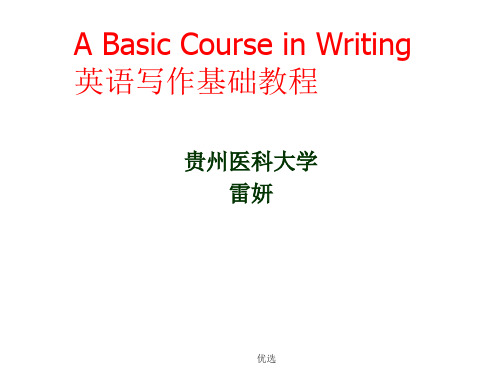
Adventures of Huckleberry Finn
优选
10
一、Manuscript Form
1. Arrangement
(8). The first line of every paragraph should be indented (started after a space of four or five letters)
(9). Arabic numerals are generally used for paging. They can be put either in the upper righthand corner or in the middle below the last line of every page.
(6). Every word of the title (including words following hyphens in compound words) should be capitalized, except articles, preposition, coordinating conjunctions and infinitorm
2. Word division (1). one syllable cannot be divided 单音节
(2). two or more syllables 双/多音节
a stressed close syllable usually takes a
优选
3
一、Manuscript Form
1. Arrangement (1). two centimeters at the top (2). two centimeters at the bottom (3).one and a half centimeters on the left (4).one and a half centimeters on the right
教学日历
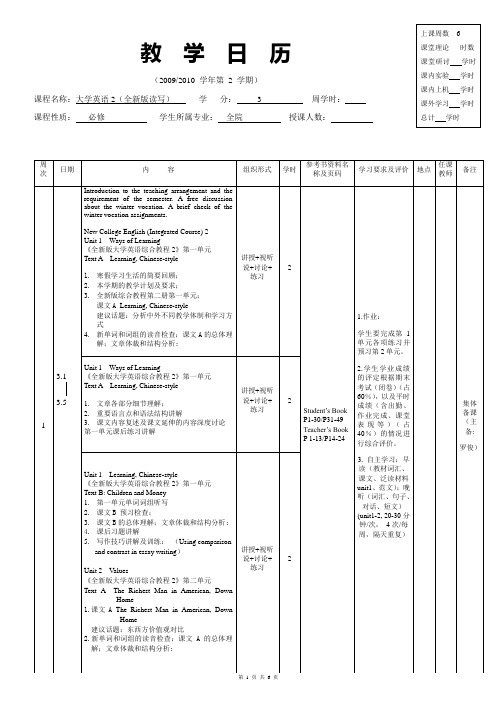
建议话题:分析中外不同教学体制和学习方式
4.新单词和词组的读音检查;课文A的总体理解;文章体裁和结构分析;
讲授+视听说+讨论+练习
2
Student’s Book
P1-30/P31-49
Teacher’s Book P 1-13/P14-24
1.作业:
《全新版大学英语综合教程2》第五单元
Text A True Height
1.文章各部分细节理解;
2.重要语言点和语法结构讲解
3.课文内容复述及课文延伸的内容深度讨论
4.课后练习讲解
讲授+视听说+讨论+练习
2
Student’s Book
P145-174/
P175-193
Teacher’s Book P 47-56/
2
Unit 1 Learning, Chinese-style
《全新版大学英语综合教程2》第一单元
Text B: Children and Money
1.第一单元单词词组听写
2.课文B预习检查;
3.课文B的总体理解;文章体裁和结构分析;
4.课后习题讲解
5.写作技巧讲解及训练:(Using comparison
New College English (Integrated Course) 2
Unit 1 Ways of Learning
《全新版大学英语综合教程2》第一单元
Text A Learning, Chinese-style
1.寒假学习生活的简要回顾;
2.本学期的教学计划及要求;
3.全新版综合教程第二册第一单元;
高中英语基础写作教案
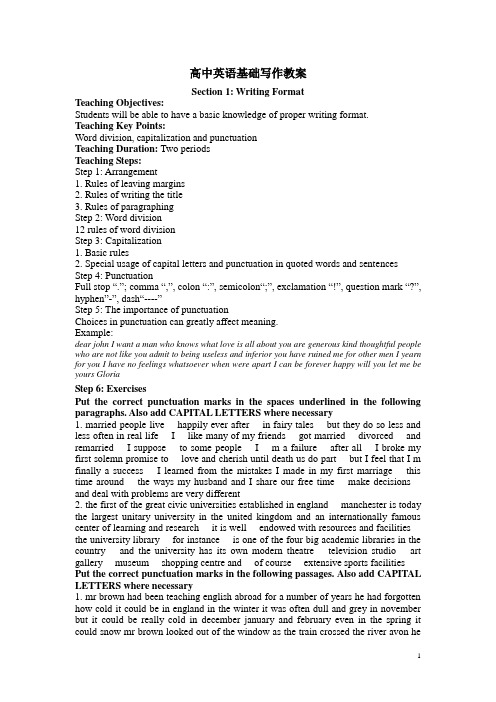
高中英语基础写作教案Section 1: Writing FormatTeaching Objectives:Students will be able to have a basic knowledge of proper writing format.Teaching Key Points:Word division, capitalization and punctuationTeaching Duration: Two periodsTeaching Steps:Step 1: Arrangement1. Rules of leaving margins2. Rules of writing the title3. Rules of paragraphingStep 2: Word division12 rules of word divisionStep 3: Capitalization1. Basic rules2. Special usage of capital letters and punctuation in quoted words and sentences Step 4: PunctuationFull stop “.”; comma “,”, colon “:”, semicolon“;”, exclamation “!”, question mark “?”, hyphen”-”, dash“----”Step 5: The importance of punctuationChoices in punctuation can greatly affect meaning.Example:dear john I want a man who knows what love is all about you are generous kind thoughtful people who are not like you admit to being useless and inferior you have ruined me for other men I yearn for you I have no feelings whatsoever when were apart I can be forever happy will you let me be yours GloriaStep 6: ExercisesPut the correct punctuation marks in the spaces underlined in the following paragraphs. Also add CAPITAL LETTERS where necessary1. married people live__ happily ever after__ in fairy tales__ but they do so less and less often in real life __I__ like many of my friends__ got married__ divorced__ and remarried__ I suppose__ to some people__ I__ m a failure__ after all__ I broke my first solemn promise to __love and cherish until death us do part__ but I feel that I m finally a success__ I learned from the mistakes I made in my first marriage__ this time around__ the ways my husband and I share our free time__ make decisions__ and deal with problems are very different__2. the first of the great civic universities established in england__ manchester is today the largest unitary university in the united kingdom and an internationally famous center of learning and research__ it is well __endowed with resources and facilities__ the university library__ for instance__ is one of the four big academic libraries in the country__ and the university has its own modern theatre __television studio__ art gallery__ museum__ shopping centre and __of course __extensive sports facilities__ Put the correct punctuation marks in the following passages. Also add CAPITAL LETTERS where necessary1. mr brown had been teaching english abroad for a number of years he had forgotten how cold it could be in england in the winter it was often dull and grey in november but it could be really cold in december january and february even in the spring it could snow mr brown looked out of the window as the train crossed the river avon heremembered the weather forecast that he had heard on the bbc at 9 oclock that Tuesday morning it said that it would be wet and windy in the north west manchester where he was now travelling to was unfortunately in the northwest2. let me just say again that i think that investing in the space program is also an investment in the people i think that the long range benefits of the space program can drastically change life on this earth for everyone i think that mankind has the chance to move ahead to make real progress toward a better life and that this will happen as a result of scientific achievements in space I think we invest more in our existing social programs we will be thinking only about today and forgetting tomorrow we will not be moving forwardSection 2: Usage of wordsTeaching Objectives:Students will be able to have a basic knowledge of choosing and using words properly.Teaching Key Points:Choice and use of wordsTeaching Duration: One periodTeaching Steps:Step 1: Principles: appropriate; exact; idiomatic; interestingStep 2: Being appropriateWriting styles: formal, common, colloquialThe levels of words: formal (learned or big words), common (daily used), colloquial (informal familiar conversation)Step 3: Being exactTry to use specific words and pay attention to connotative General——professional ----- scientist ------ chemist -------biochemist——specific Example:Country: refers to an area of land and its population and government.Nation: emphasizes the people of a country.State: refers to the government or political organization of a country.Land: is less precise but more literary and emotive.Step 4: Being idiomaticTry to use idioms. Idioms are fixed groups of words with a special meaning which is different from the meanings of the words that form it. All the phrasal verbs, set expressions, pairs of words and sayings.Step 5: Being interestingThere are various ways of using words figuratively. They are called figures of speech or rhetorical devices. Such use makes the expression more interesting and vivid. Step 6: Dictionary1. How to use a dictionary2. Useful dictionariesSection 3: SentencesTeaching Objectives:1. Students will be able to write correct sentences.2. Students will be able to write sentences of different patterns with same meanings. Teaching Key Points:How to write correct sentencesTeaching Duration: Five periodsTeaching Steps:Step 1: The introduction of sentencesCorrect sentence: grammatical concept, that is, the sentence should be correct in grammar.Effective sentence: refers to the fact that a sentence can achieve the goal of communication.How to achieve effective sentences?1. Unity“All roads lead to Rome.” ---“All words lead to a single thought.”2. CoherenceTry to avoid faulty parallel constructions/prons with ambiguous references/ dangling or misplaced modifiers/ confusing shifts in person and number or in voice, tense and mood.3. ConcisenessAvoid being wordy.4. EmphasisEmphatic sentences should be used.5. VarietyMix the long and short sentences, simple and compound complex sentences as well as try to use some rhetorical sentences.The purpose of seeking sentence variety is to avoid monotony in one’s speech or writing so as to achieve the most satisfactory result in communication.Step 2: Coordinate sentences1. What are coordinate sentences?Examples:We must make great efforts to catch up, or we will lag behind the others forever. Honey is sweet, but the bee stings.2. Conjunctionsand, as well as, both…and, not only… but also, neither, norbut, however, whereas, while, yet, still, instead, nevertheless, notwithstanding, on the other hand, not… but, rather than, in contrast, on the contraryor, nor, or else, otherwise, either…orbesides, also even, moreover, likewise, furthermore, what’s more, in additionfor, thus, so, therefore, hence, consequently, accordingly, as a resultthen, meanwhile, subsequently, afterward, laterthat is ( to say ), in other words3. ExercisesCombine each group of the following sentences by using such connecting words as and, but, yet, for, so, or, nor, to make them into compound sentences.1. Mr. Smith has stayed in London for five years.He knows the city quite well. (so)2. The old man stood on the street.He didn’t know which way to go. (for)3. The two sides were asked to settle the dispute by themselves.Soon they reached an agreement. (and)4. Jimmy fell off his bike.He was unhurt. (but)5. Let’s hurry up.We will be late. (or)6. I like classical music.My sister likes popular music. (yet)7. We may stay here for another few days.We may go right now. (or)8. The boss is flying to New York.His secretary will be responsible for daily affairs. (so)9. We fished all day long.We did not catch a thing. (yet)10. Mr. Fisher does not love the food.He is not accustomed to the climate, either. (nor)Step 3: Complex sentences1. Adverbial clausesExamples: Hardly had I opened the door when the telephone rang.He had to put on his coat because the wind was blowing harder and harder.He talked clearly so that he could leave a good impression upon theinterviewer.He is doing the job as he was asked to.Even if he was over seventy years of age, he insisted on reading regularly.The story was so interesting that the children would like it to be told againand again.A host does not show his guests around the house unless there is a specialreason for doing so.2. Attributive clausesExamples: They have been invited to visit their country, which is very kind of them.The headmaster, with whom the parents had discussed their son’s future,advised the boy to take up engineering.Let’s think of a situation where this idiom can be used.3. Noun clausesExamples: We demanded a guarantee that no similar incident would take place again.I hope that we could talk about the problem in the next few days.That he will come and help you is certain.This is how Henry solved the problem.5. Exercises.Translate the following sentences into English using complex sentences.1. 我正在街上走着,这时忽然有人从后面拍我的肩膀。
英语写作基础教程
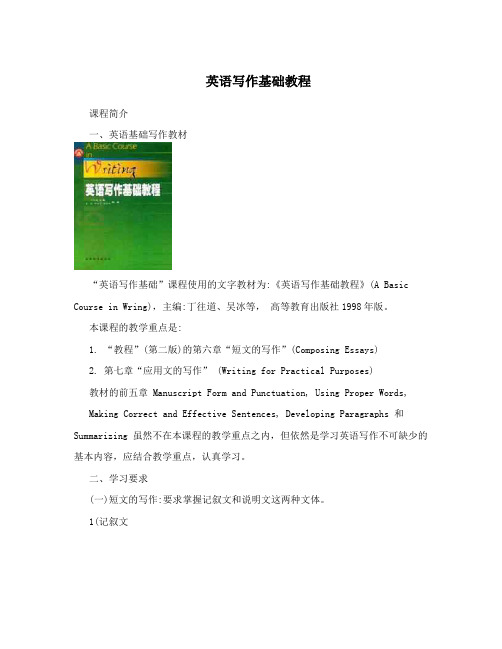
英语写作基础教程课程简介一、英语基础写作教材“英语写作基础”课程使用的文字教材为:《英语写作基础教程》(A Basic Course in Wring),主编:丁往道、吴冰等,高等教育出版社1998年版。
本课程的教学重点是:1. “教程”(第二版)的第六章“短文的写作”(Composing Essays)2. 第七章“应用文的写作” (Writing for Practical Purposes)教材的前五章 Manuscript Form and Punctuation, Using Proper Words, Making Correct and Effective Sentences, Developing Paragraphs 和Summarizing 虽然不在本课程的教学重点之内,但依然是学习英语写作不可缺少的基本内容,应结合教学重点,认真学习。
二、学习要求(一)短文的写作:要求掌握记叙文和说明文这两种文体。
1(记叙文叙述一件事情或一系列事情的文章是记叙文。
这类文体的涉及面很广,包括讲故事——真实的故事及虚构的故事,也包括传记、历史故事等。
记叙文与描写文关系十分密切,因为要讲一件事(讲故事)就离不开对人物、景物等的描述。
在写记叙文时,要注意以下几点:(1)要开门见山。
文章一开始,就要把发生的事情和主要人物及时间、地点说清楚,使读者一目了然。
(2)要言之有物。
写好一件事必须要有实例及细节,但是,细节描写过多(容易使人不得要领,因此,对例子和细节一定要选择恰当,使用那些与主题思想关系密切的、有说服力的事例。
(3)写作时要把一件事的前因后果组织好,层次要分明,发展要自然,结尾要水到渠成。
陈述的方法可以根据时间先后顺序安排,也可倒叙,但是,倒叙对写作技巧的要求要更高一些。
(4)可以用第三人称写,也可以用第一人称写。
用第一人称写比较亲切、自然、真实,但局限性比较大。
用第三人称写比较自由灵活,而且往往显得更客观,但是对写作技巧的要求更高一些。
2013英语阅读1(教学日历)

1、课程 英语阅读-12、上课院部 轻工学院 专业 英语班级 2013英语1 班 人数 30 3、讲课教师 路阳 4、辅导教师 路阳 5、系、室主任 签章周 次讲 次教 学 内 容 及 周 时 分 配执行情况 及 备 注授 课 内 容课 内 学 时 数课外学时数课内外周学时总数 讲 课 听 力 习题课测 验 合 计 复 习 作 业 合 计 6 1 Opening-up of College English & Unit 1 Lead-in, difficult language points 2 2 1 2 3 5 中秋节、国庆节等假期的具体时间根据学校的通知确定。
2 Unit 1: Text structure analysis1.5 0.5 2 1 2 3 5 7 3 Unit 1: Viewing, Listening and Speaking 2 2 1 2 3 5 4 Unit1 Reding Skills ,exercises and quiz 1 0.50.5 2 1 2 3 5 8 5 Unit 2 : Lead-in, difficult language points 2 2 1 2 3 5 6 Unit 2: Text structure analysis1.5 0.5 2 1 2 3 5 9 7 Unit 2: Viewing, Listening and Speaking 2 2 1 2 3 5 8 Unit 2: Reading Skills ,exercises and quiz 1 0.50.5 2 1 2 3 5 10 9 Unit 3 :Lead-in , difficult language points 2 2 1 2 3 5 10 Unit 3: Text structure analysis1.5 0.5 2 1 2 3 5 11 11 Unit 3: Viewing, Listening and Speaking 2 2 1 2 3 5 12 Unit 3: Reading Skills ,exercises and quiz 1 0.5 2 1 2 3 5 1213Book Report (1)1121235河北联合大学轻工学院教 学 日 历2013 —2014 学年 第 1 学期1、6-17周 每周 4学时2、本学期上课周数 12 周3、本学期课内总学时数 48 学时 其中:讲课 26 学时: 听力 10 学时 习题课(或课内讨论) 9 学时:测验 3 学时4、机动 4 学时5、课内课外学时比 1:1.5 学时14 Unit 4:Lead-in , difficult language points 1 1 2 1 2 3 513 15 Unit 4: Text structure analysis 2 2 1 2 3 516 Unit 4: Viewing, Listening and Speaking 1.5 0.5 2 1 2 3 514 17 Unit 4: Reading Skills ,exercises and quiz 2 2 1 2 3 518 Unit 5 :Lead-in , difficult language points 1 0.50.5 2 1 2 3 515 19 Unit 5: Text structure analysis 2 2 1 2 3 520 Unit 5: Viewing, Listening and Speaking 1 0.5 0.5 2 1 2 3 516 21 Unit 5: Reading Skills ,exercises and quiz 2 2 1 2 3 522 Book Report (2) 1 1 2 1 2 3 517 23 Book Report (3) 1 1 2 1 2 3 524 Conclusion of the English Reading Book1 & Revision 1 1 2 1 2 3 5总计26 10 9 3 48 28 56 84 140备注:任课教师接到院(部)教学办分配的下一学期教学任务后,根据本课程的教学大纲、下学期的校历和课程表,于学期结束前一周填写教学日历二份,送交系、室主任审核后,再由系、室转交院(部)教学办一份。
oqdilAAA《英语基础写作》教学大纲

o q d i l A A A《英语基础写作》教学大纲-CAL-FENGHAI-(2020YEAR-YICAI)_JINGBIAN《英语基础写作》教学大纲一、课程名称:英语基础写作二、课程类别:专业必修课三、教学时数:周学时数 2,总学时数 68四、学分:4五、开课时间:第3-4学期六、开课专业:英语专业七、教学对象:英语专业本科八、教学目的:《英语写作》是针对英语专业本科二年级学生开设的专业基础课程。
本课程的任务是要求学生系统地掌握英语写作的基本理论、不同种类文体的写作方法及基本写作技巧,能够独立完成各种常用文体的写作。
九、课程内容:(1)文体:exposition, narration, description, argument, etc.(2)文体拓展方法:illustration, comparison and contrast, making analogy, classifying and dividing the subject, repetition, etc.(3)基本写作技巧:ways of brainstorming, ways of beginning, ways of conclusion, ways of development, readership awareness, genre awareness, peer editing, peer response, cohesion and coherence, responding to teacher feedback, how to use dictionaries, how to search and make use of internet resources, etc.十、教学时间安排:十一所用教材:Ding, W. 2005. Handbook of English Writings. Beijing: Foreign Language Teaching and Research Press.十二教学参考书目:Hyland, K. 2005. Teaching and Researching Writing.Beijing: Foreign Language Teaching and Research Press.Langan, J. 2004. College Writing Skills with Readings. (5th ed.) Beijing: ForeignLanguage Teaching and Research PressParker, J. F. 1982. The Writer’s Workshop. Canada: Addison-Wesley Limited.十三、考核方式:考试。
英语写作 教学日历
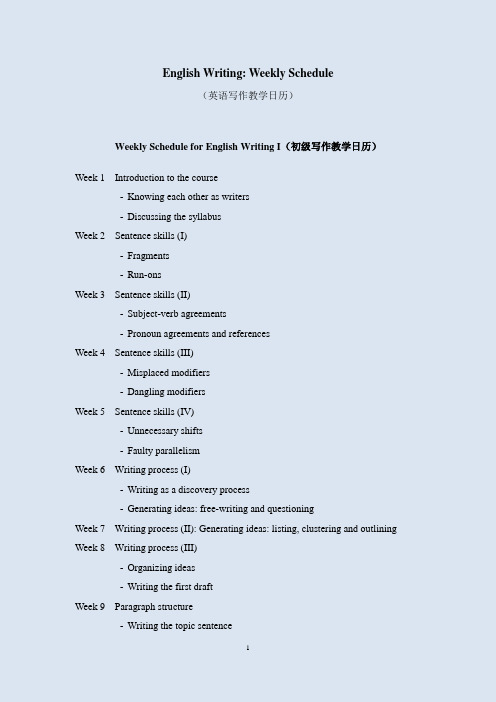
English Writing: Weekly Schedule(英语写作教学日历)Weekly Schedule for English Writing I(初级写作教学日历)Week 1 Introduction to the course-Knowing each other as writers-Discussing the syllabusWeek 2 Sentence skills (I)-Fragments-Run-onsWeek 3 Sentence skills (II)-Subject-verb agreements-Pronoun agreements and referencesWeek 4 Sentence skills (III)-Misplaced modifiers-Dangling modifiersWeek 5 Sentence skills (IV)-Unnecessary shifts-Faulty parallelismWeek 6 Writing process (I)-Writing as a discovery process-Generating ideas: free-writing and questioningWeek 7 Writing process (II): Generating ideas: listing, clustering and outlining Week 8 Writing process (III)-Organizing ideas-Writing the first draftWeek 9 Paragraph structure-Writing the topic sentence-Writing supporting evidenceWeek 10 Paragraph unity (I)-Placement of the topic sentence-Distinguishing major and minor pointsWeek 11 Paragraph unity (II): Distinguishing relevant and irrelevant pointsWeek 12 Paragraph coherence-Using transitional words to achieve coherence-Using parallel structure to achieve coherenceWeek 13 Paragraph completeness: Using sufficient evidenceWeek 14 Paragraph development (I): Introduction to different patternsWeek 15 Paragraph development (II): Development by time orderWeek 16 Paragraph development (III): Development by time orderWeek 17 Paragraph development (IV): Development by comparison and contrast Week 18 Wrapping-up: Revision and preparation for the final examinationWeeks 19-20 Final examinationsWeekly Schedule for English Writing II(中级写作教学日历)Week 1 Introduction to the courseWeek 2 The writing process and the format of an essayWeek 3 Description (I): Describing a person, a place or an objectWeek 4 Description (II): Expository description of a graphWeek 5 NarrationWeek 6 Exposition: Illustration (I): Explaining with concrete examplesWeek 7 Exposition: Illustration (II): Distinguishing concrete examples from assumptions and habitual actionsWeek 8 Exposition: Process AnalysisWeek 9 Exposition: Cause and Effect (I): Distinguishing significantcauses/effects from insignificant onesWeek 10 Exposition: Cause and Effect (II): Patterns of developmentWeek 11 Exposition: Comparison and Contrast (I): Purposes of comparing and contrastingWeek 12 Exposition: Comparison and contrast (II): Patterns of development Week 13 DefinitionWeek 14 Division and ClassificationWeek 15 Argumentation (I): Methods of ArgumentationWeek 16 Argumentation (II): Patterns of developmentWeek 17 Note writingWeek 18 Wrapping-up: Revision and preparing for the final examinationWeeks 19-20 Final examinationsWeekly Schedule for English Writing III(高级写作教学日历)Week 1 Introduction to the course- Purpose and objectives- Achievement requirements and syllabusWeek 2 Writing to summarize- Discussion of summary writing- Sample analysisWeek 3 Taking notes by summarizing, paraphrasing and quotingWeek 4 Critical reading and thinking (I): Critical reading and thinking of a text Week 5 Critical reading and thinking (II): Three ways to read a textWeek 6 Writing a critical review (I)Week 7 Writing a critical review (II): Logical fallaciesWeek 8 Writing a synthesis (I)- Discussion of synthesis writing- Explanatory synthesisWeek 9 Writing a synthesis (II): Argumentative synthesisWeek 10 Writing to analyze (I)- Discussion of analysis writing in general- Discussion of the writing of a rhetorical analysisWeek 11 Writing to analyze (II): Interpretive analysisWeek 12 Writing to analyze (III): Analysis based on an established theoryWeek 13 Writing a position argumentWeek 14 Writing a problem-solution paper (I): Writing a problemWeek 15 Writing a problem-solution paper (II): Proposing a solutionWeek 16 Documenting sources (I)- Introduction to MLA Style- In-text citationWeek 17 Documenting sources (II): Works Cited pageWeek 18 Wrapping-up: Getting ready for the finalsWeeks 19-20 Final examinationsSpecial Note: This course schedule is not rigid. Each instructor of this course may vary a little in the order of the topics and extend or cut parts of the content within the framework of the course objectives if it suits them.。
第三版高级英语1教学日历16-17 1

III. Macro-structure of the Text
IV. Detailed study of the text
1.Revision
2. Doing the exercises.
第
7
周
Unit 3. Blackmail
(1 period):
1.Alice Walker and her creation
2.American Blacks and their culture
3.Title explanation
II. Introduction to the passage
1. Type of literature: a short story
language points;
grammar points;
figures of speech
IV.Assignments
1. Revision
2.Doing the exercises
第
10
周
Unit 4.The Trial That Rocked the World
(3 periods):
I.Going on with the detailed study of the text:language points;grammar points;figures of speech
I.Pre-reading: 1.Background information
1. Henry Louis Mencken
2. WilliamJenningsBryan
3.United StatesLaw
4.Introduction to the passage
Unit1 Writing(教学课件)-高中英语人教版(2019)选择性必修第一册

Para.1: Brief Intriduction
Para.2: Educational experience
beginning
Para.3: Work experience & achievement Para.4: Mid-life crisis Para.5: Appearance & Personality Para.6: Death
After graduating from _________( 学 校 ), he/she spent most of his/her time in doing/on________. Despite many difficulties, he/she managed to overcome them. With strong will and great determination, he achieved the great success in_______, which made him ___________(成就).
概 —family background & identity
介绍人物出生的时间、地点和家庭背景, 常用非谓语结构或定语从句, 使 文章更简洁, 语言更丰富。
• 托马斯·爱迪生生于美国,是一位伟大的科学家和发明家。
Born in America, Thomas Edison was a great scientist and inventor. 职位头衔:用同位语, 年龄性别与家境也可用同位语。
➢ have further study in…/go abroad for the further education 出国深造
他就读于北京大学, 后赴伦敦深造, 获得博士学位。
英语基础写作I

英语基础写作I一、课程名称:《英语写作》(1) English Writing(I)课程负责人:刘丽英二、学时与学分:36学时 2学分三、课程类别:全校提高课程学生四、课程教材:丁往道、吴冰、钟美荪等《英语写作手册》,外语教学与研究出版社,1994五、参考教材:徐广联《英语写作精华》,兵器工业出版社,1993;James M. McCrimmon. Writingwith a Purpose. Houghton Mifflin Company六、开课单位:外国语学院七、课程目的、性质和任务:该课程的主要目的是提高学生实际运用英语表达自己的思想的能力。
通过教学让学生掌握选词造句、谋篇布局等基本知识、写作规则及技巧,提高他们表达思想的准确性与鲜明性。
通过全面的写作训练,提高学生的观察分析和逻辑思考的能力。
该课程为一门实践性较强的课程,在理论讲解的基础上,着重学生的大量实践练习。
为学生高年级的论文写作等课程打下坚实的基础。
本课程有利于学生掌握、了解新知识、新信息,有利于学生增强创新意识、培养实践能力,做到学以致用。
八、课程的主要内容:写作格式、措词、句子的组成、段落及短文写作。
重点教授英语写作的基础内容,使学生掌握好措词,学会正确使用标点。
另外,学生还要掌握句子、段落、提纲方面的最基本的写作理论与技巧,以便写出主题较为突出、内容较为完善、语言较为通顺、格式符合要求的段落来,九、课程的基本教学要求:学生的积极参与。
十、说明:教学采用英语讲授、教材、讲义合用的方法;改革传统的教学方法—成果教学法,采用新的教学法—过程教学法;把握好输入与输出的关系,多启发,多练习。
十一、考核方式:闭卷考式。
十二、学时分配: 2学时/周,共18周大纲制订者:蔡以强大纲审定者:邹晓玲英语基础写作II一、课程名称:《英语写作》(2) English Writing(II)课程负责人:刘丽英二、学时与学分:36学时 2学分三、课程类别:全校提高课程学生四、课程教材:丁往道、吴冰、钟美荪等《英语写作手册》,外语教学与研究出版社,1994五、参考教材:徐广联《英语写作精华》,兵器工业出版社,1993;James M. McCrimmon. Writingwith a Purpose. Houghton Mifflin Company梁荣建现代出版社1990;ENGLISH-CHINESE THE COMPLETEAPPLYING DOCUMENTS OF FOREIGN TRADE六、开课单位:外国语学院七、课程目的、性质和任务:在学期初的几周,课程的设置主要是为了增强学生在四级考试中的应变能力作一系列实时训练,然后通过老师对构思及文章发展的分析来加强学生的谋篇布局的能力。
- 1、下载文档前请自行甄别文档内容的完整性,平台不提供额外的编辑、内容补充、找答案等附加服务。
- 2、"仅部分预览"的文档,不可在线预览部分如存在完整性等问题,可反馈申请退款(可完整预览的文档不适用该条件!)。
- 3、如文档侵犯您的权益,请联系客服反馈,我们会尽快为您处理(人工客服工作时间:9:00-18:30)。
Sentence translation
Writing as Communication: Teacher’s Manual.主编刘海平,上海外语教育出版社,2014年,p2-9
2.https://
第五周
9月24日
2.Grasp the sentence pattern SVO
Write a paragraph about“agriculture”
1.Writing as Communication: Teacher’s Manual.主编刘海平,上海外语教育出版社,2014年,p18-25
2.https:///
2.https:///
第十一周
11月5日
至
11月9日
一
2
Test 1
Paper Test1 (30%)
Preview Unit 6
Writing as Communication: Teacher’s Manual.主编刘海平,上海外语教育出版社,2014年,p46-56
第十二周
第七周
10月8日
至
10月12日
一
2
Unit 3 College English
Part I: Task 1
Part II: Task 1&2
Part III: Task 1
Sentence development: Transitive verbs
1.Master the related expressions;
沈阳师范大学
教学日历
国际经济与贸易、金融专业2018年级2018-2019学年第1学期
课程名称:英语写作基础1课程代码:17201270教学班号:
周次
教学作业类别及内容
讲授
实践环节
课外作业
参考书目
星期
时数
教学大纲的章节、题目
实验课、习题课
题目和题数
书名、章节、页数
第一周
8月27日
至
8月31日
一
2
Enrollment
Write a composition about“crime”
1.Writing as Communication: Teacher’s Manual.主编刘海平,上海外语教育出版社,2014年,p18-25
2.https:///
第九周
10月22日
至Hale Waihona Puke 10月26日一2
Unit 4 Major
1.Master the related expressions;
2.
Grasp the feature of simple sentence
3.Understand what is sentence fragments
Write a composition about“media”
1.Writing as Communication: Teacher’s Manual.主编刘海平,上海外语教育出版社,2014年,p36-45
11月12日
至
11月16日
一
2
Unit 6 Doing the DINK
3.Introduce the four descriptors in IELTS writing test
Preview Unit 1
雅思大作文评分标准https:///view/ef1ade8afc0a79563c1ec5da50e2524de418d05b.html
第四周
9月17日
至
9月21日
一
2
Unit 1 University, My University (1)
Part I: Task 1 & 2&3
Part II Task 2
Sentence development: Link verbs
1.Master the related expressions;
Writing as Communication: Teacher’s Manual.主编刘海平,上海外语教育出版社,2014年,p26-35
第十周
10月29日
至
11月2日
一
2
Unit 5 Community Service
Part I: Task 2&3
PartII: Task1&2&3 &4
Sentence development: simple sentence
Part I: Task 1&2&3
Part II: Task 2
Sentence
development: SVOO
1.Master the related expressions;
2.Grasp the usage of sentence pattern SVOO
Sentence translation
第二周
9月3日
至
9月7日
一
2
New orientation program
第三周
9月10日
至
9月14日
一
2
Introduction
1.Know the purpose and the aim of the course;
2.Understand requirements of the course.
Write a paragraph about“keeping fit”
1.Writing as Communication: Teacher’s Manual.主编刘海平,上海外语教育出版社,2014年,p10-17
2.https:///
第六周
10月1日
至
10月5日
一
2
National Day Holiday
第八周
10月15日
至
10月19日
一
2
Unit 3 College English
Part I: Task2
Part II: Task 1&3
Sentence development: Transitive verbs
1.Master the related expressions;
2.Grasp the sentence pattern SVOC
至
9月28日
一
2
Unit 2 University, My University (2)
Part I: Task 1&2&3
Sentence development:Intransitive verbs
1.Master the related expressions;
2.Grasp the usage of intransitive verbs
